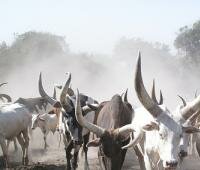South Sudan: Conflict is 'fact of life'
Issues:Competition over resources, Global militarisation
In a radio interview for the BBC, Dr Sara Pantuliano of the Overseas Development Institute highlights a tribal conflict in Jonglei State that has grown particularly violent. The conflict between the Murle and Luo-Nuer groups has traditionally centred on cattle-raiding (cattle being a vital element of the region's economy for centuries), but recently it has taken on the character of a 'military assault' along ethnic lines. Dr Pantuliano attributes this change to both the sheer number of weapons flooding the region, and to the anonymity and consequent remoteness of modern warfare. Compounding these factors is the diminished status of chiefs and elders and the effectiveness of the traditional checks and balances that they enforce, compromised as they have been by the protracted civil wars of the past.
This case is symptomatic of the general lack of security in South Sudan, which is overwhelming the small UN security presence put in place after independence last summer. It is therefore extremely important that the causes of insecurity are targeted because the symptoms are already causing serious damage in this young country.
BBC Radio4 Today Programme, 03 January 2012
Tens of thousands of South Sudanese people are fleeing from their homes, after inter-ethnic clashes around the town of Pibor.
The United Nations is warning villagers to run for their lives ahead of advancing fighters from a rival tribe.
Parthrsary Rajendran, head of mission for Medecins Sans Frontieres in South Sudan, speaks on the phone from the capital Juba.
Dr Sara Pantuliano, Sudan analyst at the Overseas Development Institute, says that this is part of a "long-standing conflict" in the region.
Conflict is a "fact of life" between these two social groups, she adds, but the cattle wars have now become more like "military assaults" as the authority of the elders and chiefs has diminished as a result of the "massive proliferation" of weapons in the region.
To hear the interview, click here
Article Source: BBC
Image Source: Oxfam International
 Delicious
Delicious Digg
Digg StumbleUpon
StumbleUpon Reddit
Reddit
Posted on 4/01/12

Comments
Post new comment